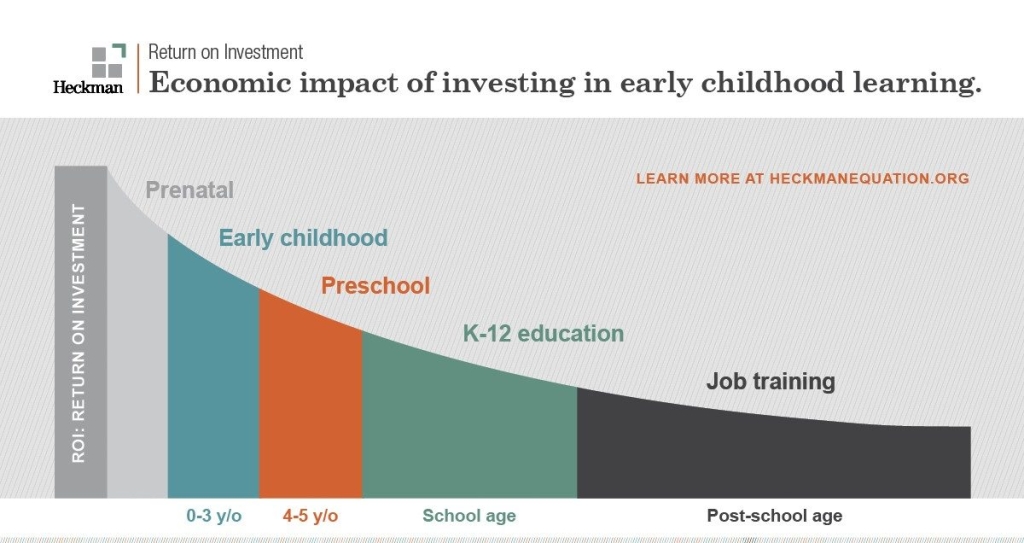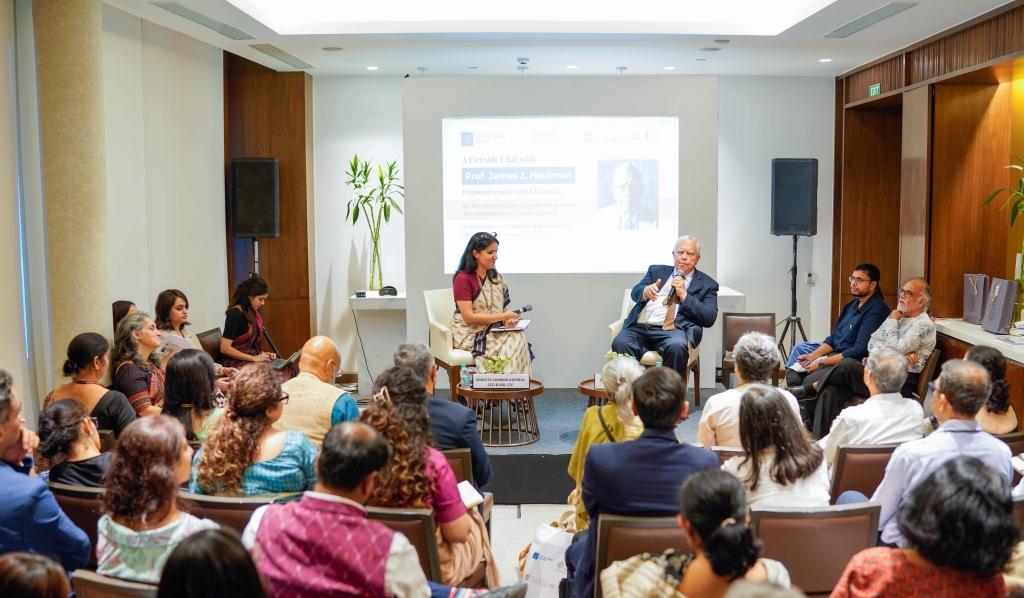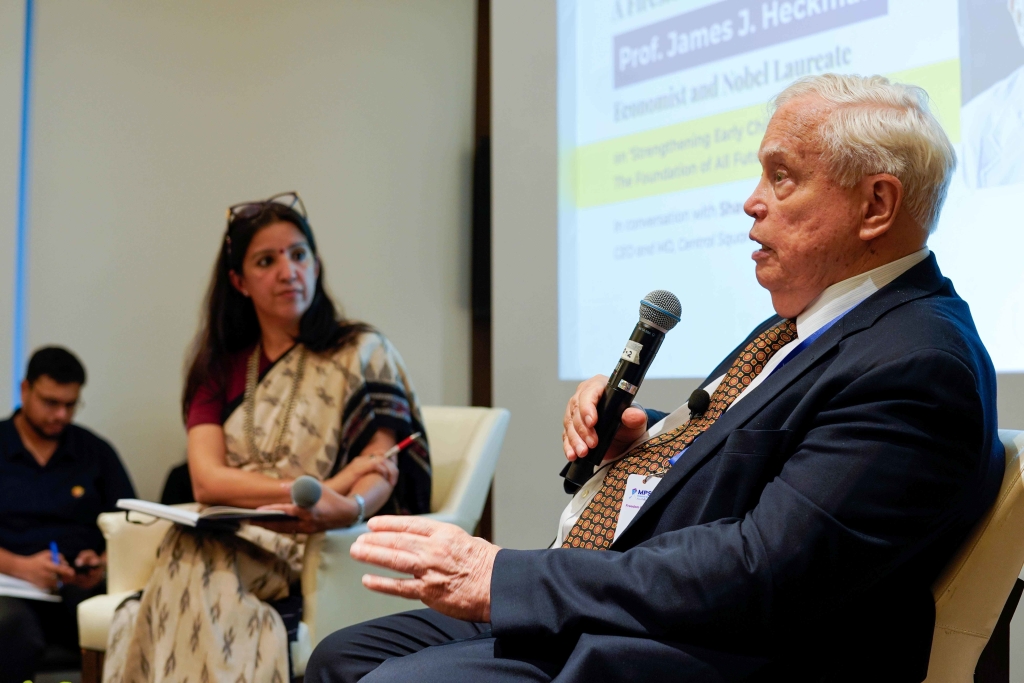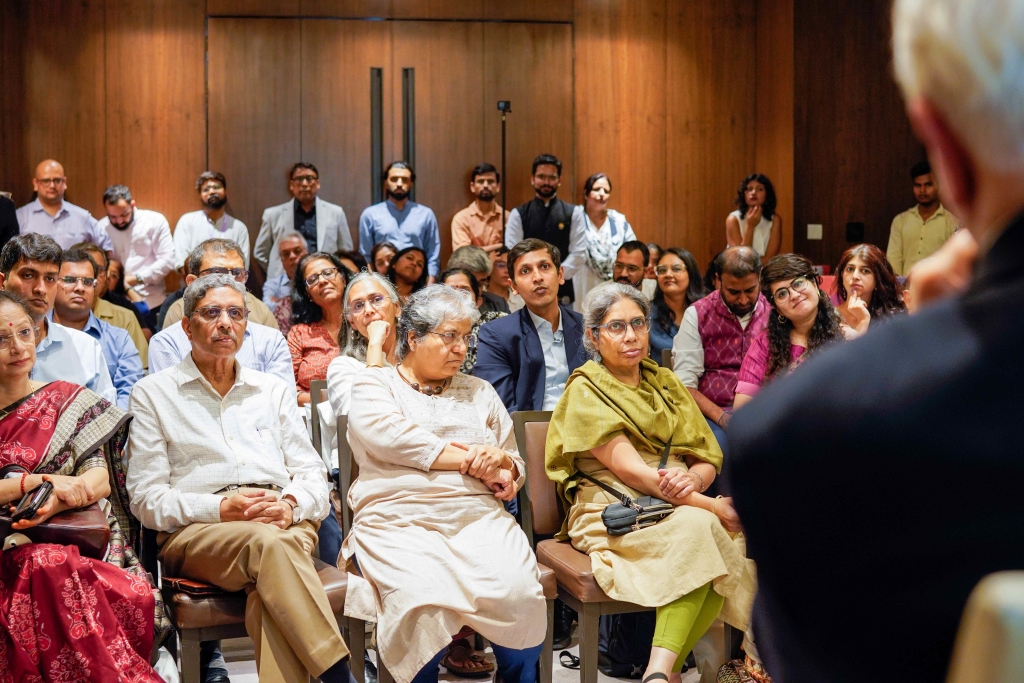 Go Back
Go BackShare
Reflections from an Interaction with Prof. James Heckman on ‘Strengthening Early Childhood Education’
By Mahima Kansal and Sanjay Koushik
Sep 30, 2024
In this blog, we share reflections and highlights from a Fireside Chat with Nobel Memorial Prize Winner, Prof. James J. Heckman, organised by Central Square Foundation (CSF), Centre for Civil Society (CCS) and the University of Chicago Centre in Delhi.
Early childhood education (ECE) lays the foundation for lifelong learning and development, significantly influencing future academic, social and economic outcomes. Economist and Nobel Laureate Prof. James Heckman’s work on human capital emphasises the high return on investment in ECE, as early interventions enhance cognitive and non-cognitive skills, which are critical for success. Heckman’s research shows that quality ECE not only boosts individual potential but also reduces social inequality, making it a key driver for economic growth and societal well-being. Investing in ECE, therefore, provides the most effective strategy for developing human capital and achieving sustainable progress.

Central Square Foundation (CSF), Centre for Civil Society (CCS) and the University of Chicago Centre in Delhi hosted a fireside chat between Nobel Memorial Prize Winner, Prof. James J. Heckman and Shaveta Sharma-Kukreja (CEO & MD, CSF), on Strengthening Early Childhood Education: The Foundation of all Future Learning, on 23 September 2024. The event featured compelling conversations, exploring the critical role of early education in shaping life skills.
Held at Andaz, Aerocity, New Delhi, the session brought together thought leaders, policymakers and educators for an evening of insightful discussions. The discussions underscored ECE’s role in shaping lives, driving economic growth and creating equitable societies.

Here are some key takeaways from the session:
- Lifelong Benefits for Disadvantaged Populations: ECE holds unparalleled potential to uplift children from disadvantaged backgrounds. Citing evidence from programmes like the Perry Preschool Project, the conversation highlighted how early interventions not only boost academic performance but also lead to better health, higher employment rates and reduced crime. ECE, therefore, acts as a critical lever for breaking intergenerational poverty and fostering social mobility.
- Broad Societal Impact: Beyond individual benefits, high-quality ECE contributes to societal wellbeing. It reduces crime, improves public health and increases economic productivity, making it a smart, long-term investment for governments. By cutting future public expenditures on healthcare, social services and criminal justice, ECE demonstrates its value as a public good with far-reaching effects.
- Human Capital: The Engine of Economic Growth: Prof. Heckman emphasised the role of human capital as a cornerstone of economic progress. Developing cognitive and non-cognitive skills — such as self-control and perseverance — starts in early childhood. These foundational skills lay the groundwork for a skilled and adaptable workforce, crucial for sustained economic growth.
- Character Skills: Character traits like conscientiousness and perseverance, developed during early childhood, are as vital as intellectual abilities for life success. Prof. Heckman stressed that ECE programmes targetting these traits are more effective than later-stage interventions, which often fail to capitalise on this critical developmental period.
- Parental Engagement: The role of parents in amplifying the impact of ECE cannot be overstated. Programmes like the Jamaican Intervention and Dublin’s Home-Visiting Program showcase how active parental involvement in early learning yields enduring benefits. These insights underscore the importance of designing ECE initiatives that include and empower parents.


Policy Implications: A Unified Approach to ECE
The discussions underscored the need for a holistic approach to early childhood education that integrates efforts across sectors like education, health and social welfare. Prof. Heckman pointed to examples such as Argentina, where multi-ministerial collaborations have amplified the impact of ECE policies. While India’s New Education Policy (NEP) 2020 is a promising foundation, the event highlighted the potential of further cross-ministry coordination to maximise outcomes for children and society.
Measuring What Matters
Effective evaluation of ECE programmes must extend beyond academic achievements. Prof. Heckman emphasised the importance of including non-cognitive skills — like perseverance, motivation and emotional intelligence — in assessments, as these are key predictors of long-term success. Teacher observations emerged as a reliable method for capturing these developmental milestones, ensuring a more comprehensive understanding of a programme’s impact.
These insights highlight actionable strategies for strengthening ECE systems, underscoring its role as a critical driver of individual and societal progress.
Conclusion
Early childhood education is a transformative force for creating a more equitable and prosperous society. By prioritising the critical early years, when the brain is most receptive to learning, we can ensure that all children, especially those from disadvantaged backgrounds, are equipped for lifelong success. The insights shared by Professor Heckman provide a clear and compelling case for policymakers: investing in ECE is not just an educational necessity but a societal imperative, offering far-reaching benefits that will resonate across generations.
Keywords
Authored by
Mahima Kansal
Project Manager, Policy and Communications, Central Square Foundation
Sanjay Koushik
Senior Project Lead, Early Childhood Education, Central Square Foundation
Share this on
